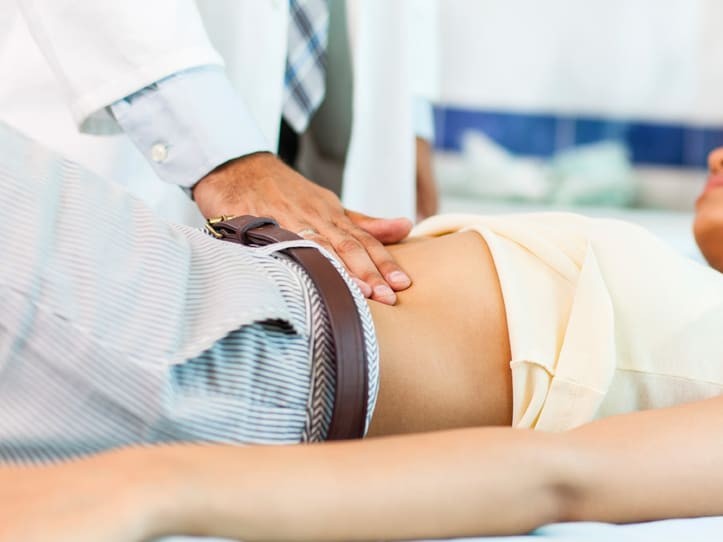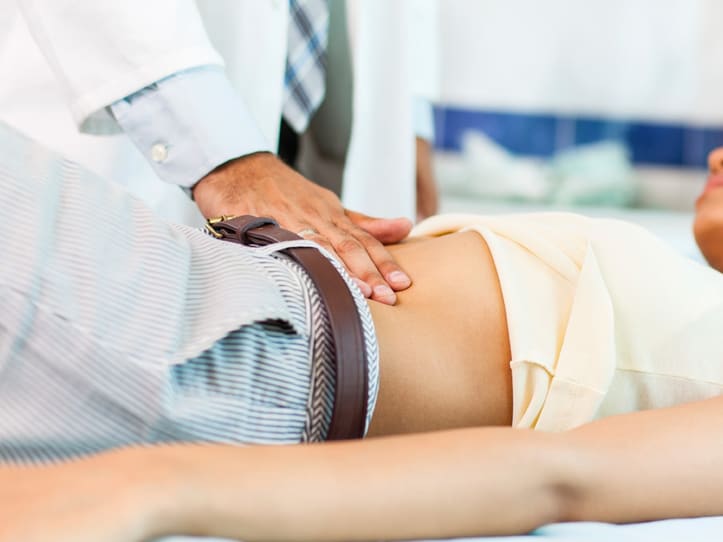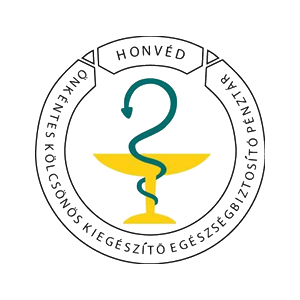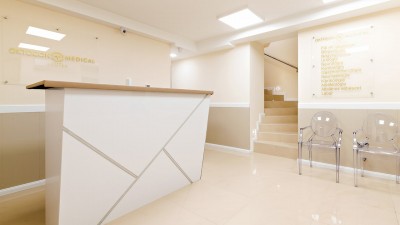This type of diagnostic procedures within gastroenterology mainly aims at the identification of several diseases of the digestive system.
Endoscope is a flexible, tube-like instrument with a special, strong, cold-light source camera built in its tip. Images detected by the camera are transferred through a dedicated system to a real-time monitor that displays actual status of the examined region.
More information about large bowel endoscopy (colonoscopy)
To perform a colonoscopy, endoscope is introduced through the anus.
Thus the mucosal layer and lesions of the entire large bowel section (colon) can be analyzed, including the rectum, the sigmoid colon, descending, transverse and ascending colon, the vermiform appendix (blond gut) and, sometimes, a short section of the small intestine as well. One of the great benefits of this procedure is that it allows us to identify even the most tiny lesions, changes that could not be detected by other examinations (abdominal ultrasound, CT).
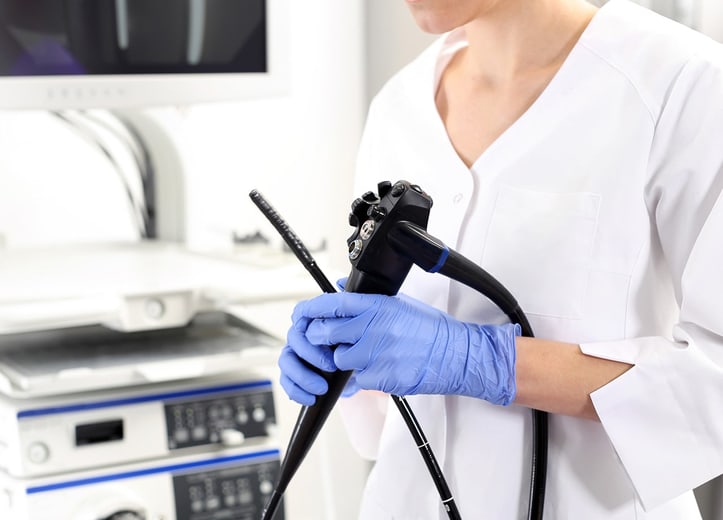
It means that diseases can be diagnosed even at their very early, symptom-free stage, significantly improving the efficiency of the therapy.
Such conditions may include:
- ulcers
- benign and malignant tumours
- blood vessel disorders, bleedings
- erosions
- herniations of the mucosal lining
- strictures of different origin.
For early diagnosis of large bowel cancer, colonoscopy is the most appropriate method. Large bowel polyps, which are not removed, may transform into colon cancer with time; therefore, their removal at an early stage may prevent the development of malignant tumours. Furthermore, so called in situ cancers (very early stage tumours without symptoms) can be identified, resulting in a nearly 100% recovery.
Thanks to this procedure, chances for recovery (prognosis) are far better since the affected areas can be visually checked in a direct way and examined several times from several angles. It also allows storing and retrieving the images at any time. These photos can be magnified and contrast of the critical parts be enhanced.
An additional advantage of endoscopy is the opportunity to collect samples for histological analysis, improving the certainty of the diagnosis.
Beyond diagnostics, also some particular interventions can be performed, including the removal of polyps, elimination of strictures, removal of foreign bodies from the intestines, arrest of bleeding.
How to prepare for a colonoscopy?
In order to perform the procedure optimally and get the most precise diagnose possible, the digestive tract must be prepared appropriately. Consequently, thorough cleansing of the bowels is crucial. For this reason, we use a special bowel cleansing product prescribed by the specialist. Use of this agent should be combined with a suitable diet; on the day before the examination consumption of lumpy foods and other foods and drinks as instructed by the specialist.
If the bowel section to be assessed is not clear enough duration of the procedure may be prolonged and makes it much more difficult to get a correct diagnosis.
Naturally, the specialist will prepare the patient for the procedure thoroughly within the frame of a preliminary consultation. He/She informs the patient about how to carry out bowel cleansing. The patient is instructed to temporarily suspend or substitute one or more of his/her usual medicines (e.g. anticoagulant), if necessary.
Immediately prior to the examination, the patient reads the informed consent, then, by signing it, agrees to undergo the colonoscopy. Informed consent is also signed by the doctor. Overall cooperation of the patient is extremely important, with special regard to information on medications taken so that it can be considered by the specialist during the examination.
Which undesired effects or symptoms may occur during the procedure?
Colonoscopy may inherently cause some discomfort. These include abdominal bloating, feeling of sickness, nausea, abdominal pain etc.

Their occurrence and intensity depends on various conditions, such as anatomical properties, pain tolerance, medical history (previous surgeries), medication taking habits of the patient.
How can these undesired symptoms be mitigated or eliminated?
Colonoscopy can also be performed under sedation, by giving an intravenous injection immediately prior to the procedure so as to relieve pain. It does not necessarily means general anaesthesia, which might be the case as well, rather a relaxed state in which the patient might even be able to communicate with the doctor. It makes the examination easier for both parties, often shortening the duration of the procedure.
In addition to sedation, general anaesthesia is also available in our centre.
This service is provided by an anaesthesiologist and an anaesthesiology nurse. The patient will not remember any part of the examination, which is absolutely painless in this case.
Before introducing anaesthesia, the anaesthesiologist performs medical check of the patient. In some cases, when concomitant diseases are present, further preliminary examinations may be necessary to carry out, such as ECG, cardiology, pulmonology, lab tests). Presence of certain chronic diseases (e.g. cardiac problems) may raise the risks of general anaesthesia. Consequently, the gastroenterologist (endoscopy specialist) discusses with the anaesthesiologist if general anaesthesia can be used.
What to expect during a colonoscopy?
The patient is asked to take off his/her underwear and also top layers of the upper clothing. The procedure is started with the patient lying on his/ her left side but it may become necessary to change this position during the colonoscopy. If colonoscopy is carried out without general anaesthesia the patient must follow the instructions of the doctor and the nurse.
In an empty, cleansed state, intestinal walls stick together; consequently, some air should be blown in to make the mucosa well visible. In case of abdominal bloating, the patient is allowed to leave this air go out; ian additional, new volume of air can be inflated, upon the specialist's decision.
In a relaxed state of the muscles and the entire body, the procedure becomes faster and easier, taking only about 15 to 30 minutes to perform.
Following a colonoscopy done under sedation or general anaesthesia upon the patient's request, he/she may have a rest for a while in a recovery room (either in the presence of his/her relative until the sedative wears off.
For the rest of the day, working in high or dangerous places, as well as driving a car is prohibited; therefore, the patient should make sure to arrange someone to take him/her home.
In case if bloating, strong abdominal pain or bleeding occurs after the procedure, seek medical attention immediately!
Complications are very rare (1 in 10,000) related to colonoscopy, yet, they sometimes may occur. These include allergic reactions to the analgesic, sedative or anaesthetic; bleeding or injury caused by the endoscope.